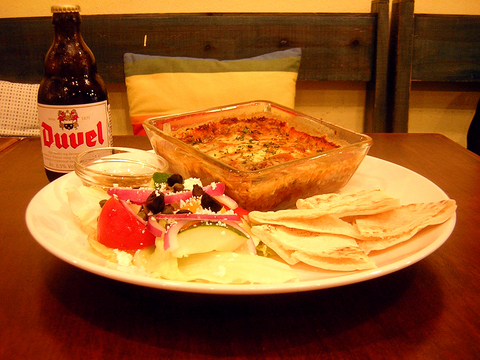Only a couple of Greek restaurants in Taipei strive to be authentic, and one of them is Greek - Go!
As owner He Sheng-hsun (何昇勳) tells it, fate intended for his to be so.
The former Liberty Times music critic was on vacation in Greece and looking for inspiration when he stumbled upon a restaurant whose friendly proprietor gave him advice and allowed to take pictures.

PHOTO: RON BROWNLOW, TAIPEI TIMES
Having studied ancient Greek philosophy in college, He believes Taiwanese — who he says tend to equate money with happiness — could learn a lot from the culture.
Hence the restaurant’s name Greek - Go! (希臘左巴) is a play on the Chinese for “Let’s go to Greece” (希臘走吧).
But Greek - Go! isn’t simply a case of someone taking their vacation home with them. Everything from the space’s cozy atmosphere to the quality of service speaks of meticulous preparation.
The restaurant was designed by He’s brother, an interior designer. The color-scheme is soft yellows and blues with wood-finish tables.
CDs from He’s extensive music collection — he likes Galaxy 500, the Smiths and Yang Nai-wen (楊乃文) — are stacked neatly on wooden shelves. His sister-in-law, who runs Greek - Go!’s Taida branch, is a painter and designs a lavish new menu with photographs and her artwork every six months.
Staff on a recent visit were polite and at ease with customers, even when asked to explain the menu in English.
And the food — at least for a reviewer who used to live in a predominately Greek part of Queens, New York — was a close approximation of the real thing.
He Sheng-hsun recommends the moussaka (NT$290), made from lamb, eggplant, rice and 10 different spices and grilled with a topping of grated cheese. A vegetarian version is also available. He also recommends the more traditionally Greek mixed greens salad (NT$180) and Greek omelet (NT$180).
In addition, there are standards like grilled chunks of lamb (NT$350), which are marinated with lemon, olive oil, garlic, white wine and a mixture of spices that’s heavy on rosemary.
There are a few Chinese-style dishes on the menu, too. He served more of these when he opened his first branch on Shida Road nine years ago, but he has slowly been phasing them out.
In case you’re wondering, Taipei’s other “authentic” Greek restaurant is Mykonos, which recently moved to a new location on Siwei Road.
The difference, He said, is that his dishes are more Greek, while the other’s are more Turkish.

June 2 to June 8 Taiwan’s woodcutters believe that if they see even one speck of red in their cooked rice, no matter how small, an accident is going to happen. Peng Chin-tian (彭錦田) swears that this has proven to be true at every stop during his decades-long career in the logging industry. Along with mining, timber harvesting was once considered the most dangerous profession in Taiwan. Not only were mishaps common during all stages of processing, it was difficult to transport the injured to get medical treatment. Many died during the arduous journey. Peng recounts some of his accidents in

“Why does Taiwan identity decline?”a group of researchers lead by University of Nevada political scientist Austin Wang (王宏恩) asked in a recent paper. After all, it is not difficult to explain the rise in Taiwanese identity after the early 1990s. But no model predicted its decline during the 2016-2018 period, they say. After testing various alternative explanations, Wang et al argue that the fall-off in Taiwanese identity during that period is related to voter hedging based on the performance of the Democratic Progressive Party (DPP). Since the DPP is perceived as the guardian of Taiwan identity, when it performs well,

The Taiwan People’s Party (TPP) on May 18 held a rally in Taichung to mark the anniversary of President William Lai’s (賴清德) inauguration on May 20. The title of the rally could be loosely translated to “May 18 recall fraudulent goods” (518退貨ㄌㄨㄚˋ!). Unlike in English, where the terms are the same, “recall” (退貨) in this context refers to product recalls due to damaged, defective or fraudulent merchandise, not the political recalls (罷免) currently dominating the headlines. I attended the rally to determine if the impression was correct that the TPP under party Chairman Huang Kuo-Chang (黃國昌) had little of a

At Computex 2025, Nvidia CEO Jensen Huang (黃仁勳) urged the government to subsidize AI. “All schools in Taiwan must integrate AI into their curricula,” he declared. A few months earlier, he said, “If I were a student today, I’d immediately start using tools like ChatGPT, Gemini Pro and Grok to learn, write and accelerate my thinking.” Huang sees the AI-bullet train leaving the station. And as one of its drivers, he’s worried about youth not getting on board — bad for their careers, and bad for his workforce. As a semiconductor supply-chain powerhouse and AI hub wannabe, Taiwan is seeing